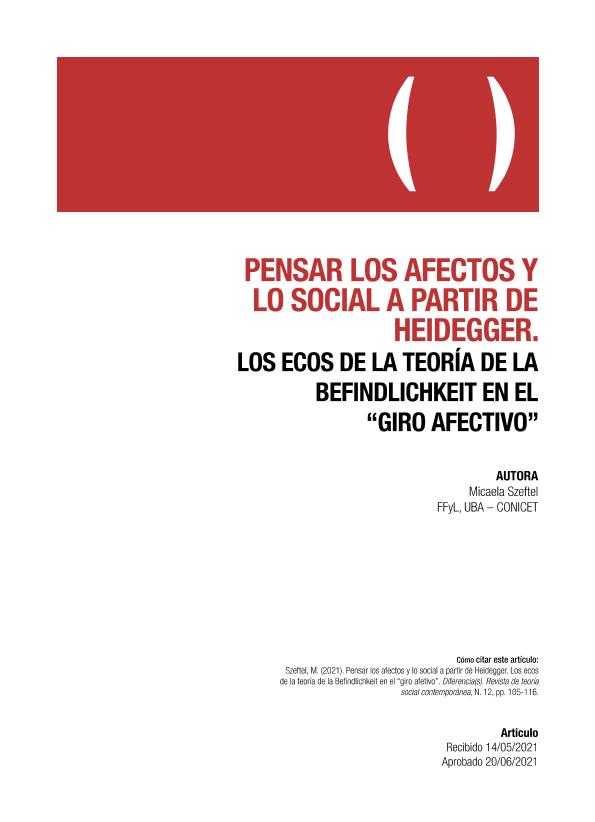Mostrar el registro sencillo del ítem
dc.contributor.author
Szeftel, Micaela

dc.date.available
2021-12-03T19:08:54Z
dc.date.issued
2021-06
dc.identifier.citation
Szeftel, Micaela; Pensar los afectos y lo social a partir de heidegger: Los ecos de la teoría de la befindlichkeit en el ''giro afectivo''; Universidad de Buenos Aires. Facultad de Ciencias Sociales. Instituto de Investigaciones Gino Germani. Grupo de Estudios sobre Estructuralismo y Posestructuralismo; Diferencia(s); 1; 12; 6-2021; 105-116
dc.identifier.issn
2469-1100
dc.identifier.uri
http://hdl.handle.net/11336/148172
dc.description.abstract
En el presente ensayo se busca precisar la relevancia de la perspectiva heideggeriana sobre los afectos para el “giro afectivo” que comenzó a permear las ciencias humanas y sociales hace ya cuarenta años. Esta tarea incluye, en primer lugar, una elaboración de la Befindlichkeit heideggeriana en las obras clásicas sobre el tema con el fin de identificar las características de una inautenticidad afectiva que el “uno” (“das Man”) pone en circulación, dictando así un modo de sentir adecuado y normal. La salida de esta normatividad involucra el “despertar” de ciertos temples de ánimo señalados como la angustia y el aburrimiento, pero si esa es una salida individual o colectiva es un dilema que sigue siendo debatida. En segundo lugar, se intentará exponer cómo resuena este problema en la discusión actual de la filosofía, la teoría social y los estudios culturales sobre el rol de los afectos en la dimensión pública, política y cultural. El objetivo de este trabajo, alcanzado en la tercera sección, es mostrar estos ecos y cómo, algunas teorías del “giro afectivo” intentan superar el dilema por medio de una técnica del “destemplamiento”.
dc.description.abstract
This paper intends to specify the importance of Heidegger’s perspective regarding affects on the so called “affective turn” that overflies the humanities and social sciences during the past forty years. Firstly this task includes an approach to the heideggerian Befindlichkeit in the classical works on the subject in order to identify the traits of an inauthentic affectivity that is set in circulation by “the one” (“das Man”) and dictates a normal and adequate way of feeling things and bestowing value to them. The way out of this normativity entails an “awakening” of certain moods such as anxiety and profound boredom, but whether this exit is executed by an individual or by the community is a dilemma that is still open for debate. Secondly I will try to showcase how this problem resonates in the current discussion on the role of affects in the public, political and cultural sphere that is carried out by philosophy, social theory and cultural critique. The main goal of this paper, reached in section 3, is to show these echoes and how some theories try to overcome the dilemma by suggesting a technique of “unattunement”.
dc.format
application/pdf
dc.language.iso
spa
dc.publisher
Universidad de Buenos Aires. Facultad de Ciencias Sociales. Instituto de Investigaciones Gino Germani. Grupo de Estudios sobre Estructuralismo y Posestructuralismo
dc.rights
info:eu-repo/semantics/openAccess
dc.rights.uri
https://creativecommons.org/licenses/by-nc-sa/2.5/ar/
dc.subject
Heidegger
dc.subject
Giro afectivo
dc.subject
Afectividad inauténtica
dc.subject.classification
Filosofía, Historia y Filosofía de la Ciencia y la Tecnología

dc.subject.classification
Filosofía, Ética y Religión

dc.subject.classification
HUMANIDADES

dc.title
Pensar los afectos y lo social a partir de heidegger: Los ecos de la teoría de la befindlichkeit en el ''giro afectivo''
dc.type
info:eu-repo/semantics/article
dc.type
info:ar-repo/semantics/artículo
dc.type
info:eu-repo/semantics/publishedVersion
dc.date.updated
2021-11-09T18:54:41Z
dc.identifier.eissn
2469-1518
dc.journal.volume
1
dc.journal.number
12
dc.journal.pagination
105-116
dc.journal.pais
Argentina

dc.journal.ciudad
Ciudad Autónoma de Buenos Aires
dc.description.fil
Fil: Szeftel, Micaela. Universidad de Buenos Aires. Facultad de Filosofía y Letras. Instituto de Filosofía "Dr. Alejandro Korn"; Argentina. Consejo Nacional de Investigaciones Científicas y Técnicas; Argentina
dc.journal.title
Diferencia(s)
dc.relation.alternativeid
info:eu-repo/semantics/altIdentifier/url/http://www.revista.diferencias.com.ar/index.php/diferencias/article/view/241
Archivos asociados
